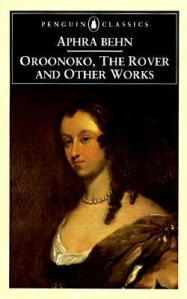In her book A Room of One’s Own, Virginia Woolf writes that, “All women together ought to let flowers fall upon the tomb of Aphra Behn, for it was she who earned them the right to speak their minds.” She’s not wrong. Born in 1640, Behn was possibly the first professional female writer – she’s noteworthy, not just because she was able to support herself by writing, but because she did so without having to use a male pseudonym or apologize for her gender in any way.
I studied English at a women’s college, so I ended up taking two different classes that covered Behn’s work. Because of these classes, I’ve read The Rover, “The Fair Jilt”, and Oroonoko ( a play, short story, and novel, respectively).
“The Fair Jilt” was sort of boring and also irritating, because it’s about a woman who falls in love with a monk (who’s really a banished prince who got banished because of romantic fuck-ups) and when he rejects her advances she accuses him of raping her. He gets sent to prison to await execution, she goes on with her life, but at least karma comes around and bites her in the ass eventually. It’s preachy and kind of dull, and none of the characters are particularly likeable.
The Rover is much better, and I can’t really do it justice except by quoting the plot synopsis on the back of the book: “The Rover centers on the dissolute Cavalier Willmore, and the attempts of two spirited women – Angellica Bianca, a courtesan, and Hellena, a cross-dressing virgin – to woo him.” It reminded me of one of Shakespeare’s lighter comedies – romantic shenanigans and cross-dressing aplenty – but more R-rated. There’s a courtesan and a prostitute, and not one but two scenes where the heroine almost gets raped. But the whole play is still oddly hilarious, and I wonder what it would look like presented on stage.
Oroonoko is Behn’s most famous work, and rightly so. It follows the title character, an African prince, who gets kidnapped and sold into slavery in Surinam along with his wife, Imoinda. Life is generally terrible for everyone, and when Imoinda gets pregnant, Oroonoko tries to get them returned to their homeland. This fails, and so Oroonoko organizes a slave rebellion. It goes about as well can be expected. The story is sad, beautiful, well-written, and liberally sprinkled with Behn’s white privilege perspective. (The best example of this is when Oroonoko gets sold into slavery and put on a boat to make the infamous Middle Passage, the route that the slave ships took from Africa to South America. It was a horrendous trip, made under almost unbearable conditions, but Behn merely says that the voyage was “tedious” and skips right ahead to when we land in South America. Whoops.)
Verdict: four out of five stars

